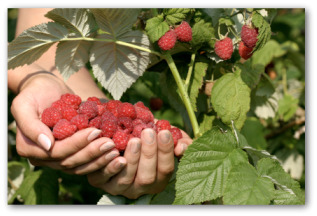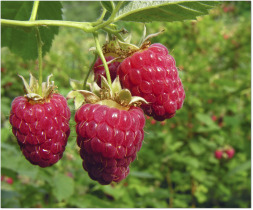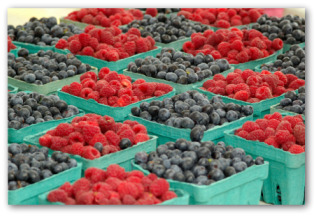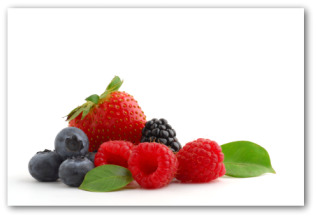
The best tips for growing raspberries in your backyard vegetable garden. Learn how to plant, care for, prune, and harvest raspberries when home gardening. Grow raspberries as an edible border if you are short of gardening space.
Of all the delicious fruits grown in the home garden, raspberries are the most productive.
This is an added bonus because growing raspberries at home is about the only way to get them to the dinner table in perfect condition.
The small red fruit is difficult to raise and ship commercially because they are so easy damaged during handling.
How to Grow Raspberries
Usually raspberries ripen in midsummer on canes that grew the previous year.You can select the variety Durham, an everbearing type that produces two crops of berries annually.
One crop is harvested in early fall and another the following summer from the same cane.
Planting Raspberries

Raspberries in a Perennial Garden
An ideal spot for growing raspberries is in a perennial fruit and vegetable garden.
Other plants to consider planting are blueberries, asparagus, perennial onions, and strawberries
Set perennials according to height in rows or blocks.
Grow Raspberry Plants as a Border
If you are short of gardening space, but want to include raspberries, consider planting a border of raspberry plants.Choose a sunny, well-drained location.
Planting and Growing Raspberries

Full sun is preferred by the growing raspberries although growing raspberries will tolerate a few hours of daily shade.
The garden bed should be well drained.
After the initial fertilizing when preparing the beds, give the plants an annual feeding of 10-10-10 fertilizer at a rate of 1 pound to 10 feet of row.
Set out 1-year canes about 2 ½ feet apart.
As the canes become established, each one forms several suckers.
Eventually a single row will become 3 to 4 feet wide.
Pull up wandering suckers to keep the row within its limits.
Remove any thin, weak stems that emerge.
This helps make the patch more manageable by making it easier to reach the inner berries and to prune the canes.

Pruning Raspberries
Pruning growing raspberries is simple once you get the hang of it!
Harvesting Raspberries
If you have to tug at the berries when picking them, it means they are not ripe.
The raspberries should slip easily from the stems at harvest time. http://www.vegetable-gardening-online.com/growing-raspberries.html
No comments:
Post a Comment